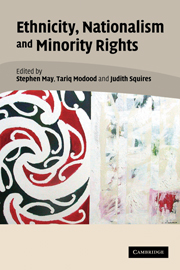Book contents
- Frontmatter
- Contents
- Preface
- List of contributors
- 1 Ethnicity, nationalism, and minority rights: charting the disciplinary debates
- Part I Ethnicity and ethnic groups
- Part II The state and minority claims
- 6 New nationalisms and collective rights: the case of South Asia
- 7 Justice and security in the accommodation of minority nationalism
- 8 Two concepts of self-determination
- Part III New directions
- Index
- References
7 - Justice and security in the accommodation of minority nationalism
Published online by Cambridge University Press: 22 September 2009
- Frontmatter
- Contents
- Preface
- List of contributors
- 1 Ethnicity, nationalism, and minority rights: charting the disciplinary debates
- Part I Ethnicity and ethnic groups
- Part II The state and minority claims
- 6 New nationalisms and collective rights: the case of South Asia
- 7 Justice and security in the accommodation of minority nationalism
- 8 Two concepts of self-determination
- Part III New directions
- Index
- References
Summary
Minority nationalism is a universal phenomenon. As Walker Connor notes, countries affected by it
are to be found in Africa (for example, Ethiopia), Asia (Sri Lanka), Eastern Europe (Romania), Western Europe (France), North America (Guatemala), South America (Guyana), and Oceania (New Zealand). The list includes countries that are old (United Kingdom) as well as new (Bangladesh), large (Indonesia) as well as small (Fiji), rich (Canada) as well as poor (Pakistan), authoritarian (Sudan) as well as democratic (Belgium), Marxist-Leninist (China) as well as militantly anti-Marxist (Turkey). The list also includes countries which are Buddhist (Burma), Christian (Spain), Moslem (Iran), Hindu (India), and Judaic (Israel).
(Connor 1999: 163–64)In all of these countries, national minorities are battling with the state – peacefully or violently – over issues of political representation, language rights, self-government, control over resources, and internal migration.
While the challenge of minority nationalism arises in all parts of the globe, the state's response to it varies tremendously from region to region. In this chapter, I want to compare the accommodation of minority nationalism in two regions: the Western democracies and the postcommunist countries of Eastern and Central Europe (hereafter ECE). The response to minority nationalism in these two regions is very different. To over simplify, we can say that in the West, there is a trend toward accepting the legitimacy of minority nationalism, and toward accommodating it through some form of territorial autonomy.
- Type
- Chapter
- Information
- Ethnicity, Nationalism, and Minority Rights , pp. 144 - 175Publisher: Cambridge University PressPrint publication year: 2004
References
- 21
- Cited by



